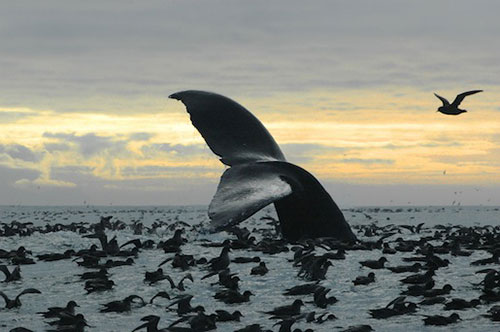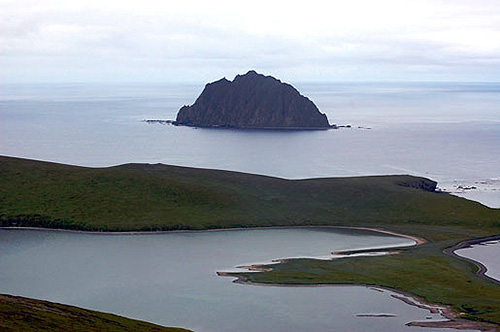
Fisheries of Bristol Bay Off Limits to Oil & Gas DevelopmentLegacy of Alaska Advocates HonoredBy MARY KAUFFMAN
December 17, 2014
Bristol Bay, located off the southeast coast of Alaska, is the heart of one of the world’s most valuable fisheries, helping to provide 40 percent of America’s wild-caught seafood and support a $2 billion annual fishing industry. The beautiful and remote area is also an economic engine for tourism in Alaska, driving $100 million in recreational fishing and tourism activity every year. Bristol Bay hosts the largest runs of wild sockeye salmon in the world, and provides important habitat for many species, including the threatened Stellar’s eider, sea otters, seals, walruses, Beluga and Killer whales, and the endangered North Pacific Right Whale. President Obama removed the area from future oil and gas development under section 12(a) of the Outer Continental Shelf Lands Act. The protected area, roughly the size of Florida, is the heart of one of the most productive fishing grounds in the country. It is bounded by the Aleutian Islands to the south and opens into the Bering Sea to the west.
A humpback whale with shearwater birds in Bristol Bay.
U.S. Senator Mark Begich (D-AK) commented on President Obama's action that will prohibit oil and gas development Alaska's salmon-rich Bristol Bay. “Bristol Bay is the world’s most productive wild salmon fishery which produces jobs for thousands of Alaskans. This economic breadbasket, which helps produce 40 percent of all of America’s seafood, will continue to provide for generations if properly managed,” said Begich in a prepared statement Tuesday. “Much of Alaska’s coastal waters, especially the promising Arctic, are open for oil and gas exploration and development. I stand with the majority of Alaskans who agree that protecting Bristol Bay’s salmon fishery is a top priority. Yesterday’s decision by President Obama to withdraw the area from all future oil and gas leasing extends indefinitely a temporary withdrawal that President Obama issued in 2010 and was set to expire in 2017. This action builds on decades of local efforts to protect Bristol Bay from oil and gas development by Alaska Native tribes and organizations, as well as local seafood and tourism businesses that create jobs and strengthen Alaska and the nation’s economy. It also honors the legacy of Alaska residents like Harold ‘Harvey’ Samuelsen, a salmon fisherman who is legendary for his lifelong dedication to Bristol Bay and to creating economic opportunities for Alaska Native and rural communities. Begich said, “There’s no Alaskan who has been a more fierce supporter of Bristol Bay than the late Yupik commercial and subsistence fishermen Harvey Samuelson. It’s appropriate to honor his legacy and contributions to Alaskans today and in the future by naming this reserve in his honor." A broad coalition of Alaska Native tribes, commercial fishermen, seafood companies, and conservation organizations voiced support for protecting Bristol Bay's fisheries. Fifty federally recognized tribes and regional tribal organizations passed resolutions supporting a permanent withdrawal for this area, as did a coalition of 20 Alaska seafood companies and trade associations. U.S. Senator Lisa Murkowski (R-AK) also responded to President Obama's decision Tuesday in a prepared statemen. “Given the lack of interest by industry and the public divide over allowing oil and gas exploration in this area, I am not objecting to this decision at this time,” Murkowski said. “I think we all recognize that these are some of our state’s richest fishing waters. What I do not understand is why this decision could not be made within the context of the administration’s upcoming plan for offshore leasing – or at least announced at the same time.” Murkowski also expressed her strong concerns that the Obama Administration is still dramatically out of step with Alaska’s most pressing needs. “It is incredibly frustrating that this administration looks at Alaska – with oil production at a fraction of the level it could be at, and with low oil prices about to force steep across-the-board budget cuts – and decides that conservation is our most pressing need,” Murkowski said. “We are not asking to produce everywhere – but right now, we are not being allowed to produce anywhere. Despite strong support, we are seeing development blocked in the Chukchi, the Beaufort, in NPR-A, and on the Coastal Plain. What we need are decisions to open lands and waters in Alaska, not the familiar and frustrating pattern of shutting everything down.”
Bristol Bay produces 40% of America's wild-caught seafood every year.
“I also believe the Interior Department must continue to invest in baseline environmental research to determine the health of fishery and crab resources in the region so that future administrations can make informed decisions,” Murkowski said. Secretary of the U.S. Department of the Interior Sally Jewell praised President Obama’s action to designate the waters of Bristol Bay as off limits to consideration for oil and gas development. “The President’s action caps decades of work from the community to protect the region’s economic and cultural heritage,” Jewell said. “With its pristine waters, rich fisheries and strong tourist economy, Bristol Bay is a treasure that should be off limits for oil and gas development.” Jewell also praised the efforts by local residents to protect Bristol Bay, especially the late Harold “Harvey” Samuelsen, a leading commercial fisherman who championed both the protection of the bay and its fisheries and the economic well-being of fishermen, native communities and other Alaskans. “We can’t overstate the importance of Harvey Samuelsen and so many other Alaskans in the protection of Bristol Bay,” Jewell said. Tuesday's action is in many ways a result of their passion for and stewardship of this special place and puts the threat of future drilling finally to rest she said. "With the removal of Bristol Bay from the federal offshore oil and gas leasing program in perpetuity, we have more certainty that our waters will be safe for the sustainable fisheries that make our jobs possible and provide a renewable economy," said David Harsila, president of the Alaska Independent Fishermen's Marketing Association. "This has been a long time coming, and Bristol Bay fishermen are breathing a collective sigh of relief." "We have great fisheries in Bristol Bay worth billions of dollars because we have protected our fishing grounds and our spawning beds from mining in the headwaters and oil and gas rigs in the ocean," said Robin Samuelsen, chairman of the Bristol Bay Economic Development Corp. "Our fisheries bring economic benefits to our people and have sustained a way of life for thousands of years." "The president's announcement is a victory for the people of Bristol Bay, who for more than 30 years have worked to secure their fishing grounds and ensure that their cultural heritage will continue to thrive for generations," said Marilyn Heiman, director of Pew's U.S. Arctic project. "It also means that the region's incredible fishing, wildlife, and cultural values are permanently protected in one of America's iconic marine habitats." The North Aleutian Basin Planning Area that includes Bristol Bay consists of approximately 32.5 million acres, a portion of which was leased in the mid-1980s but never developed due to litigation. The previous Administration set in motion a new lease sale for 2011 that would have opened approximately 5.6 million acres – about one-fifth of the planning area – for drilling. In 2010, President Obama temporarily withdrew the Bristol Bay area from oil and gas development, exercising his authority under section 12 of the Outer Continental Shelf Lands Act, which gives the President authority to withdraw offshore areas from potential oil and gas leasing. President Eisenhower was the first to exercise the authority in 1960, withdrawing an area now included in the Florida Keys National Marine Sanctuary. Since then, Presidents on both sides of the aisle have acted to withdraw areas of the Outer Continental Shelf from oil and gas leasing. Under the Outer Continental Shelf Land Act of 1953, the Department of the Interior develops a new leasing program every five years for energy development in federal offshore waters. Yesterday’s decision to withdraw the area from oil and gas leasing eliminates the sunset date to a withdrawal that President Obama issued in 2010 and was set to expire in 2017. The current Five Year Program for 2012–2017, which was set to expire in August 2017, scheduled 15 potential lease sales in six planning areas with the greatest resource potential, including more than 75 percent of the estimated undiscovered, technically recoverable oil and gas resources in federal offshore waters. Presidents have permanently withdrawn particularly valuable marine habitats twice before: President Dwight D. Eisenhower protected waters off Key Largo, Florida, and President Richard M. Nixon safeguarded an area of the Santa Barbara Channel Islands off California. Yesterday's removal does not affect the management or continuation of existing activities, including commercial, subsistence, and recreational fisheries. The Bureau of Ocean Energy Management (BOEM) is currently developing the 2017-2022 program, which will include opportunities for public comment.
Sources of News:
|
||

